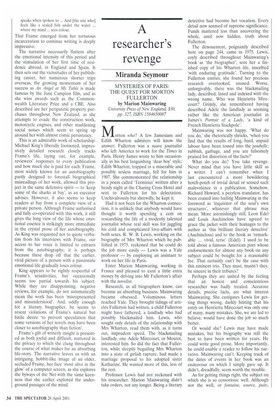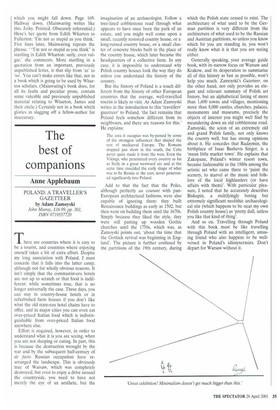A researcher's revenge
Miranda Seymour
MYSTERIES OF PARIS: THE QUEST FOR MORTON FULLERTON by Marion Mainwaring University Press of New England, $30, pp. 327, ISBN 1584650087 Morton who? A few Jamesians and Edith Wharton admirers will know the answer; Fullerton was a suave journalist who left America to work for the Times in Paris. Henry James wrote to him occasionally in his best languishing 'dear boy' style; Edith Wharton, trapped in a miserable and possibly sexless marriage, fell for him in 1907. She commemorated the relationship in a poem called 'Terminus' written after a heady night at the Charing Cross Hotel and sent to Fullerton for his delectation. Unchivalrously but shrewdly, he kept it.
Had it not been for the Wharton connection, it is unlikely that anybody would have thought it worth spending a cent on researching the life of a modestly talented journalist whose real skill was for juggling his cold and complicated love-affairs with both sexes. R. W. B. Lewis, working on the biography of Mrs Wharton which he published in 1975, reckoned that he could do the job more easily — Lewis was a Yale professor — by employing an assistant to work on her life in Paris.
Enter Marion Mainwaring, working in France and pleased to earn a little extra money by delving into Mr Fullerton's affair with the novelist.
Research, as all biographers know, can become an absorbing business. Mainwaring became obsessed. Voluminous letters reached Yale. They brought tidings of articles Fullerton had written, a child Fullerton might have fathered, a landlady who had possibly blackmailed him. Lewis, who sought only details of the relationship with Mrs Wharton, read them with, as it turns Out, imprudent speed. The blackmailing landlady, one Adele Mirecourt, or Moutot, interested him. So did the fact that Fullerton, while sleepily beguiling Mrs Wharton into a state of girlish rapture, had made a marriage proposal to his adopted sister Katharine. He wanted more of this, less of the rest.
Professor Lewis had not reckoned with his researcher. Marion Mainwaring didn't take orders, not any longer. Being a literary detective had become her vocation. Every detail now seemed of supreme significance. Funds mattered less than uncovering the whole, until now hidden, truth about Fullerton.
The denouement, poignantly described here on page 244, came in 1975. Lewis, coyly described throughout Mainwaring's book as 'the biographer', sent her a finished copy of his Wharton life, inscribed 'with enduring gratitude'. Turning to the Fullerton entries, she found her precious research overlooked, unused. Worse, unforgivably, there was the blackmailing lady, described, listed and indexed with the wrong name. Who was Henrietta Mirecourt? Grimly, she remembered having described Adele the landlady as seeming rather like the American journalist in James's Portrait of a Lady, 'a kind of French Henrietta Stackpole'.
Mainwaring was not happy. 'What do you do,' she rhetorically shrieks, 'when you find that the results of long, hard, unpaid labour have been tossed into the poubelle, rubbish, garbage, and you are fulsomely praised for distortion of the facts?'
What do you do? You take revenge. Never mind that you have little skill as a writer. I can't remember when I last encountered a more bewildering botch-potch of trivial detail or sensed such malevolence in a publication. Somehow, Richard Howard, a peerless translator, has been coaxed into hailing Mainwaring in the foreword as 'inquisitor of the soul's own structures', whatever that phrase may mean. More astonishingly still, Leon Edel and Louis Auchincloss have agreed to grace the jacket with their homages to the author as 'this brilliant literary detective' (Auchincloss) and to the book as 'remarkable ... vivid, terse' (Edel). I used to be told about a famous American poet whose endorsements for almost any book on any subject could be bought for a reasonable fee. That certainly can't be the case with this eminent trio. They must, mustn't they, be sincere in their tributes?
Perhaps they are united by the feeling that an honest and conscientious researcher was badly treated. Accurate details, precise facts, are what interest Mainwaring. She castigates Lewis for getting things wrong, darkly hinting that his entry on Henrietta Mirecourt was only one of many, many mistakes. She, we are led to believe, would have done the job so much better.
Or would she? Lewis may have made mistakes, but his biography was still the best to have been written for years. He could write good prose. More importantly, he could enable a reader to follow his narrative. Mainwaring can't. Keeping track of the dates of events in her book was an endeavour on which I simply gave up. It didn't, dreadfully, seem worth the trouble.
As for getting things right, the subject on which she is so censorious: well. Although not the well, or fontaine, source, puits,
which you might fall down. Page 169. Halfway down. (Mainwaring writes like this. Jerky. Pointed. Obscurely referential.) Here's her quote from Edith Wharton to Fullerton: 'I'm not as stupid as you think.' Five lines later, Mainwaring repeats the phrase. "I'm not so stupid as you think" is startling in Edith Wharton: surly, even vulgar,' she comments. More startling in a quotation from an important, previously unpublished letter, is that slip from 'as' to `so'. You can't make errors like that, not in a book which is going to be used by Wharton scholars. (Mainwaring's book does, for all its faults and peculiar prose, contain some valuable and previously unpublished material relating to Wharton, James and their circle.) Certainly not in a book which glories in slagging off a fellow-author for inaccuracy.



































































 Previous page
Previous page